- Home
- Jim Eldridge
Roman Invasion Page 5
Roman Invasion Read online
Page 5
There was another shout from the officer, and this time the shields were lowered and placed in their usual defensive positions.
“The tortoise comes out of its shell,” murmured Pentheus.
Another shout from the officer, and now the square reformed into a wedge shape, like the pointed head of an arrow.
“This one is the Spear,” explained Pentheus.
The officer shouted another command, and the wedge of soldiers moved forwards, the men at the very front waving their swords as if they were cutting and thrusting at the enemy. The soldiers on the outer sides of the wedge behind them were also thrusting and slashing with their swords.
“The idea is that the sharp point of the spear of soldiers pushes its way into the enemy ranks, and once it’s right in the heart of the enemy, it turns into the Circle,” said Pentheus. “Watch.”
Another shout from the officer, and now the soldiers at the side and rear of the wedge began to spread out. As they did so, those soldiers inside the wedge shape moved outwards to join them, and soon they had formed a ring of soldiers, all waving their swords, with every soldier protected by his shield.
“The Circle is perfect for defence and attack. Because it’s a closed circle, the enemy can’t attack the Roman soldiers at their backs. And the Circle can move forward, further and further into the enemy’s ranks. If one of the soldiers in the Circle is killed, the Circle just closes up and becomes a bit smaller. Now, imagine not just one wedge-shape that turns into a circle, but a line of such wedges. When they join up, it’s a strong line of attack that can’t be defended against. And there will be other wedge-shaped formations of soldiers behind those at the front.
“Bear in mind that the enemy’s best and strongest warriors are usually in the front of their battle lines. Isn’t that so?”
I nodded. That was the way it was with us Britons; our bravest and strongest in the front to give heart to the others.
“So just think about that, Bran. Once the enemy front line has been killed or run away, what will happen to the enemy further back?”
“They will die or flee,” I admitted.
“Now do you see how the Romans always win, whatever the opposition?” said Pentheus. “The real power the Romans have is in the way they organize their soldiers. Battle formations like the Tortoise and the Spear and the Circle. And they only succeed because of the Romans’ powerful military discipline. Soldiers obey orders at all times, even if it means they will die. There is no power on earth that can defeat them.”
“The Caledonians did,” I pointed out. “They drove the Romans back. That is why you’re building this road as the last line of defence.”
Pentheus smiled.
“Ah yes,” he said. “The Caledonians. But they didn’t beat the Romans because they were stronger and more organized. The landscape beat the Romans in Caledonia, in the mountains, the wooded valleys, the bogs and marshes. That, and the fact that the Caledonians outnumbered them.”
“We outnumber the Romans here,” I insisted.
“But not by enough,” said Pentheus. “And you Brigantes are not as fierce as the Caledonians. The Caledonians are like wild animals. And they know their own country, their mountains with their secret trackways and their thick dark forests, and can disappear in them without trace.” He shook his head ruefully. “No, the Romans have already got their hold on your country, young warrior. This road will be the final nail in your people’s coffin.”
Chapter XII
After a few days the soldiers we had left behind working on the first stretch of road joined us and began work on yet another stretch of road that Pentheus had marked out. And so it went on, day after day. After twelve days about thirteen miles of road had been completed.
“And here,” said Pentheus, “the soldiers will build the first fort along this road.”
Talos shook his head and held up two fingers, then pointed back the way we had come. Pentheus laughed.
“Of course, Talos is correct. This will be the second fort. The first already exists at Lugavalium, where we began our journey. But we don’t need to be involved, not at this stage. This fort will be built out of timber and earth. The soldiers will cut down trees to make the walls and pile up earth inside and out as protection. The ditches made around the outside of the fort from the digging will also be a line of defence. Later, when the governor decides to have the fort strengthened and made out of stone, then, perhaps, Talos and I will return and supervise the work. But for the moment, the soldiers don’t need our expertise. They know what they are doing: every Roman fort is built in the same way. Some forts are bigger, some are smaller, but the basic design remains the same. Wooden stakes for the outer walls with watchtowers along them. They’ll build it quickly enough. Our task is the construction of the road.”
I looked around at the open countryside, curious.
“Why build the fort here?” I asked. “There are no Brigante camps nearby to protect against. Or Caledonian.”
“The Romans build their forts a day’s march apart, which is about thirteen miles,” said Pentheus. “That way a troop of soldiers will always have shelter and protection overnight, wherever they might be along the road. After another thirteen or so miles of road have been made, they will build another fort. The next fort along the road after that will be the one they’ve already built in the east at Coriosopitum. So this road will have four forts along it, one at each end and two in the middle. And later the Romans will add more forts in between those. I suppose we could build smaller forts at closer intervals along the way, but our main purpose is to get this road finished as quickly as possible.”
We left a party of soldiers marking out the area the fort would cover, and cutting down trees to make the wooden walls, and continued on our way east with the rest of the soldiers.
I had thought that the road would continue in a straight line the whole way, but I was wrong. When Pentheus came upon a particularly large area of rocky cliffs in the way of the road, he moved the road so that it bent around them. I noticed that he made the course of the road move some distance away from the cliffs in a wide arc.
“The governor wants this road built quickly,” he explained to me. “We could spend weeks, maybe months, breaking a way through those cliffs. Much quicker to go round them.”
“But you’ve made the road longer by building it further away from the cliffs,” I pointed out. “Why didn’t you run it alongside the cliffs? That would have made the road shorter and saved you time building it.”
“To prevent an ambush,” said Pentheus. “The army likes to see where it’s going and what’s ahead. Anyone trying to ambush the army as they walk along this road will have to run over open ground.”
As the time passed I began to respect Pentheus’s skill as a surveyor and builder. The road he was building would last a very long time. And there was no obstacle he came to that would stop the stone road. We came to a river. My people would have built a wooden bridge across it, wide enough to take a cart, but only a light cart. Pentheus needed a bridge that would take the weight and strain of thousands of armoured men as well as wagons and horses crossing it, and for this he was going to build it in stone.
He set the men digging large stones out of the ground, and shaping them into squared blocks with hammers and chisels. While some were doing this, others built a frame for the bridge out of wooden poles tied together.
Pentheus had soldiers hauling rocks from the surrounding area to the river and rolling them into the water, where they were boxed in with lengths of wood cut from nearby trees. Then he got them to mix lime dust with water from the river and pour it into the boxes of rocks. In this way he built a series of solid platforms of rock and cement, with channels in between the platforms so the river could still run its course. Once he had done that, he put the men to work building columns of the cut stone blocks on these rock platforms that would support the bridge.
To build the round arches that would support the stone road over the b
ridge, he had patterns made of wood that looked like big mushrooms with round tops, and they were pushed into place in the spaces between the tops of the supporting columns. Then large stones were cut into wedge shapes, and these were put on top of the wooden mushrooms and hammered into place. When the wooden patterns were taken away, the wedges of stone stayed in place, trapped together by their weight and shape.
The whole structure was cemented to make sure it wouldn’t fall down when the strong rains came. Finally flat stones were laid across it from one side to the other. The stone bridge took time to build, but when it was finished it was very strong and very impressive. I realized what Pentheus had meant when he said that nothing could stop the Romans. Not cliffs, not rivers. And so far the only warriors who had beaten them had been the Caledonians. But Pentheus had told me that the Romans would not accept defeat by the Caledonians. Once this road was finished, they would attack the Caledonians again. And again. And again, until the whole island of Britain was under Roman rule. But I knew that would never happen. First they had to enslave my own tribe, the Brigantes, and as long as I was alive that wouldn’t happen. Even if I were the last Brigante warrior left alive, I would fight the Romans as a free Briton. The Romans would never win.
Chapter XIII
Day after day we continued, heading ever eastwards, across the bleak mountains. Up there the winds were sharp and cold the whole year round, and blew the few trees that grew there so hard they looked strange and twisted and bent. Some said that this land was cursed by the Goddess and it was a land where only the dead walked, but that didn’t stop the Romans. Whatever obstacle we came upon, rock or river or valley, or cursed land, the road continued. I had seen so much road being made in the same way, day after day, that I was sure I could build a road like that in my sleep.
Always, the soldiers worked: those who had finished their section of road far behind us caught up and then began working on a new section. It was the same with those who had built the fort: a thousand men had been left to guard the fort, while the rest marched at speed along the new road, joined us, and set to work again. By the close of the twentieth day of our journey nearly twenty miles of road had been finished, with one fort built. The road was half completed. With a thousand men still working on the road and yet to catch us up, and another thousand guarding the fort, it meant our travelling expedition was now down to three thousand soldiers.
In all that time there had only been one attack by British warriors. I wondered if this was because of my presence, because word had spread that a prince of the Carvetii was being held hostage and he would be killed if the Romans were attacked. The governor seemed certain that keeping me hostage would stop the Brigantes, but I wasn’t so sure. The truth was, although we Brigantes were all one people, there were many sub-divisions, and not all of the smaller tribes agreed with one another. Over the years I had heard of many battles taking place between different sections of the Brigante tribe. Sometimes, the battles were over who owned a particular section of land, sometimes they were feuds between different families. Not all tribes did as they were told by the king of the Brigantes. These squabbles often meant that one branch of the tribe could take it into their heads to ignore any orders sent out by the king of the Brigantes and do exactly what they wanted. And if a group of them felt like attacking the Romans, then they would. My own feeling was that the only thing that had prevented them launching a second attack so far was the size of the Roman force. But if they could find a way to get past the Roman defences, then they would.
I was soon to be proved right. As I was dropping off to sleep in Pentheus’s tent on the twentieth night of our journey, a sudden shouting and yelling from outside brought me wide awake. I recognized the sound: war cries from the Brigantes. The Brigantes were attacking the Roman camp!
I leapt to my feet and rushed out of the tent to see what was going on. Talos and Pentheus were close behind me.
Outside, the darkness was barely lit by the glowing of dying fires, left over after mealtime. It was difficult to see clearly, but every now and then metal caught the reflection of the fire glow. One thing I could see: the area around our tent was a scene of chaos: Roman soldiers, some in armour, some in their shirts, battling hand to hand with fully armed Brigantes.
The Brigante warriors had somehow managed to breach the Roman sentry lines. My guess was they had crawled slowly on their bellies, keeping low and quiet, stopping whenever a sentry moved. They would have kept watch on the sentries during the day, watching out for the ones who seemed the laziest, or the one who seemed cold and wasn’t paying as much attention as he should. My cousin Carac had told me there were always men like that in any army. He called them “the weak link”. If there were sentries like that on guard duty, then they were the ones to target when making a silent attack.
Now the Brigante warriors were inside the Roman defences, waving their swords and spears, shouting and yelling as warriors do to frighten the enemy and put them off balance. Already bodies lay on the ground, both Roman and Brigante, some dead, some wounded, some dying.
Suddenly I was aware of a movement behind me, and I spun round in time to see a Brigante warrior swing his axe at Pentheus, who managed to dodge to one side and escape most of the blow, but the axe glanced off his arm and Pentheus fell backwards against our tent, blood gushing from his wound.
The Brigante then swung round towards Talos, and hit him on the head with the handle of his axe, and Talos crumpled to the ground. The warrior swung the axe back over his head ready to chop it down on Talos. I yelled out “No! Stop!” in our own language, but I could see by the crazed look in the warrior’s eyes that he had been overtaken by bloodlust, a madness that grips some warriors deep in battle. Desperate to save Talos, I snatched up the nearest long object I could see lying on the ground, a spear, and, as the warrior swung his axe, I jerked it towards him to try and ward off the blow, or put him off balance so that he would miss. The warrior must have seen it coming out of the corner of his eye because he tried to twist away from it, but instead the force of his axe-swing made him fall forwards, and the next second the point of the spear had gone right into his throat.
The warrior gave a terrifying gurgle and blood gushed out of his mouth and nose. His eyes rolled, the axe dropped from his hands and he waved his hands in the air in front of him, as if trying to grip something, and then he crashed to the ground, the force of his fall tearing the spear handle from my grasp and pushing the point of the spear right through his neck and out the other side.
I was shocked. I had killed one of my own warriors! I began to tremble as I looked down at him. He was huge lying there on the grass, staring up at the night sky with wide-open sightless eyes, the spear right through his neck.
I felt a tug at my arm. It was Talos, standing and swaying slightly, blood trickling down his face from where the axe handle had hit him. He pointed, and I looked and saw Pentheus sitting on the ground, desperately trying to stop the flow of blood from the gaping wound in his arm, but not able to do it properly with one hand.
I gestured at Pentheus and the tent to Talos, and he nodded. Then he and I grabbed Pentheus under his arms and dragged him inside the tent. Once inside I picked up a strip of leather, wrapped it around Pentheus’s upper arm and tied it tight, and then pushed a piece of wood through and began to twist it to cut off the flow of blood to the wound. When it was as tight as it could be I took a bag of water and began to wash the blood away from the wound. The axe head had opened up the skin and the muscles beneath, but it hadn’t broken the bone.
I was looking around for something to tie around the wound to close it, when Talos stopped me. He pointed at himself, then at Pentheus’s wounded arm, and put his two hands together, knitting the fingers together to say, “I’ll mend it.”
I nodded and moved away. I was still feeling sick at what I had just done. To kill a Roman was one thing, but to kill one of my own Brigante warriors…! I felt a burning sense of shame and guilt. Every Brigante would know
what I had done. I would be an outcast! The Goddess would punish me! My soul would be forever torn to pieces by eagles!
Outside the tent the battle still carried on, but more distant now. The warriors near to us had been beaten, but there were still skirmishes going on elsewhere in the camp.
I tried to take my mind off the warrior I had killed by watching Talos at work on Pentheus’s wound. He had taken big cloves of garlic and was crushing them into a bowl. Then he gave Pentheus a piece of wood. Pentheus looked at the bowl, then he nodded and put the wood between his teeth. I realized that Talos was going to pour the juice from the crushed garlic onto the open wound, and I knew for Pentheus it would feel like having his arm set on fire. Talos poured the garlic juice over and along the open wound, and Pentheus groaned and bit down on the wood to stop to stop him biting through his tongue as he clenched his teeth against the pain.
Then Talos spread the paste from the crushed garlic into and around the wound. Sweat poured from Pentheus’s face with the pain he was suffering.
After he’d finished applying the garlic, Talos went to a bag near his bed and took out some large dried leaves. He put these along the length of the wound and began to bind the wound together with strips of clean white cloth. When that was done, he put another clean cloth over the whole wound and tied it into place. Already blood was starting to come through the cloth and stain it red, but Talos seemed satisfied.
Pentheus had stopped biting on the wood now and spat it out. Then he looked at his arm, and patted Talos on the shoulder, forcing a smile as he did so. It was then he saw for the first time the blood on Talos’s face. He gave a start and reached out towards Talos, but Talos stopped his hand and shook his head. He took a cloth and wiped the blood from his face, and both Pentheus and I could see that it had been nothing major, just a small cut high on Talos’s forehead that had bled a lot, making it look worse than it was.

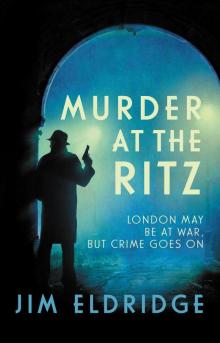 Murder at the Ritz
Murder at the Ritz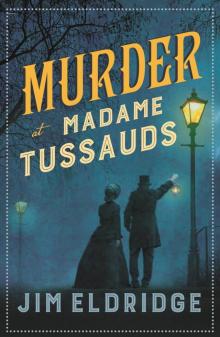 Murder at Madame Tussauds
Murder at Madame Tussauds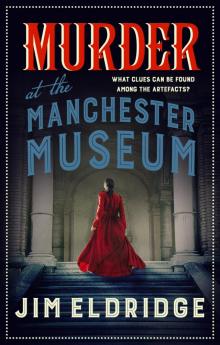 Murder at the Manchester Museum
Murder at the Manchester Museum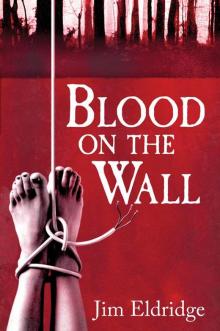 Blood On the Wall
Blood On the Wall 4.3.2.1
4.3.2.1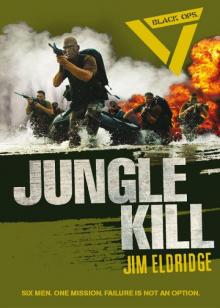 Jungle Kill (Black Ops)
Jungle Kill (Black Ops)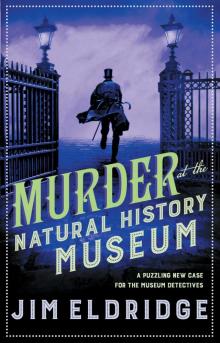 Murder at the Natural History Museum
Murder at the Natural History Museum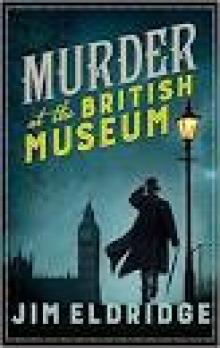 Murder at the British Museum
Murder at the British Museum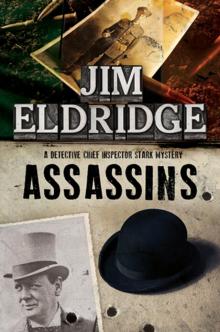 Assassins
Assassins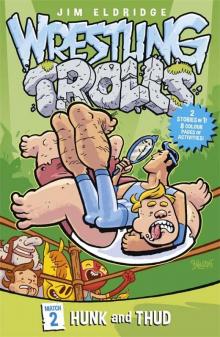 Hunk and Thud
Hunk and Thud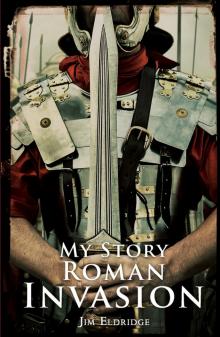 Roman Invasion
Roman Invasion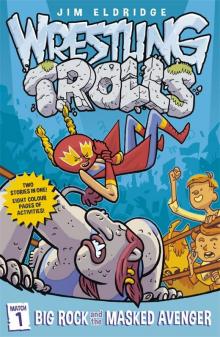 Big Rock and the Masked Avenger
Big Rock and the Masked Avenger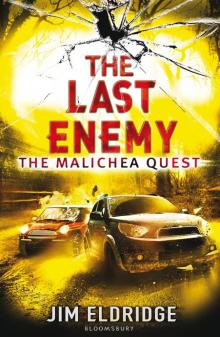 The Last Enemy
The Last Enemy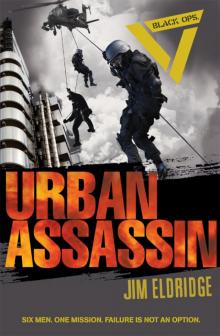 Urban Assassin
Urban Assassin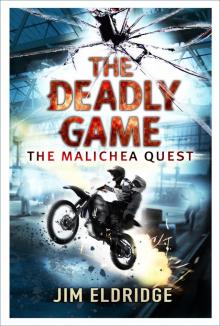 The Deadly Game
The Deadly Game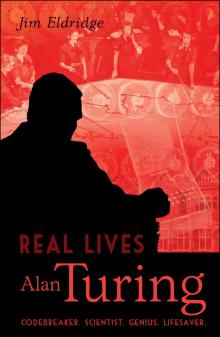 Alan Turing
Alan Turing The Lethal Target
The Lethal Target The Giant Rumble
The Giant Rumble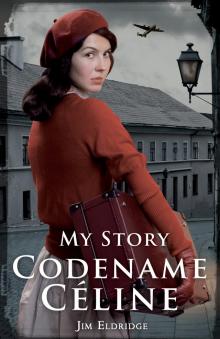 Codename Céline
Codename Céline Death in the Desert
Death in the Desert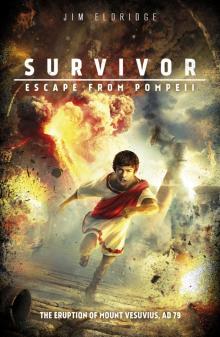 Escape from Pompeii
Escape from Pompeii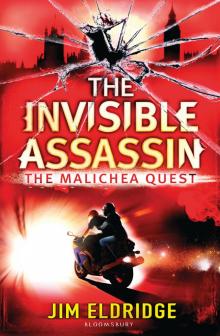 The Invisible Assassin
The Invisible Assassin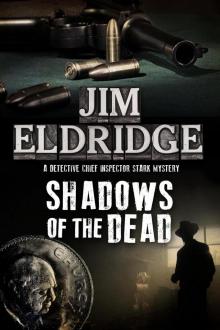 Shadows of the Dead
Shadows of the Dead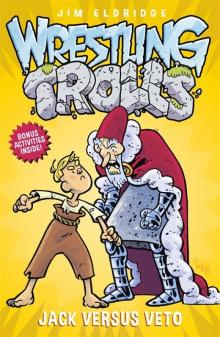 Jack Versus Veto
Jack Versus Veto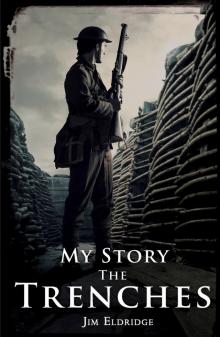 The Trenches
The Trenches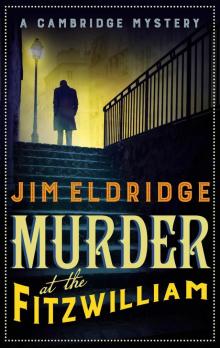 Murder at the Fitzwilliam
Murder at the Fitzwilliam Coming Home
Coming Home